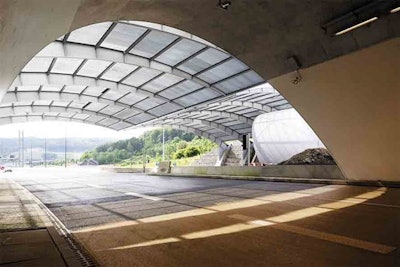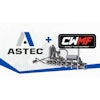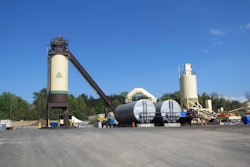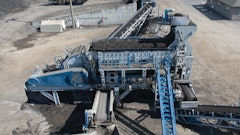
Many asphalt contractors don’t see bitumen as anything more than the sticky binder that keeps their aggregates together. However, companies are finding new ways to stretch the use of this relatively inexpensive product to help solve every day issues surrounding our roads.
From lighting a tunnel to de-icing our roadways, the ever-widening and ever-more-sophisticated range of technologies and additives available means that we can ask our road surfaces to do more than ever.
Lighten Up
For a recent project in Luxembourg, Shell Bitumen was selected as the partner to provide the product for the colored pavements in two tunnels on Luxembourg’s new Route du Nord motorway or A7.
The company provided a lower temperature polymer-modified synthetic clear binder, Shell Mexphalte C LT (low temperature), for the project.
“The light color of the asphalt is designed to help reduce lighting costs, and above all, improve the safety for users,” says Mickael Ferry of contractor Karp-Kneip.
The Shell Bitumen product was used to pave the 2,966m-long Grouft Tunnel and the 1,850m-long Stafelter Tunnel, both of which are twin bore.
The lower temperature formulation allows a decrease in laydown temperature as low as 86° F, and this in turn reduces emissions from the asphalt significantly and provides a more comfortable working environment for those laying the pavement.
In total, Karp-Kneip laid 90,000m² of the colored asphalt, and Shell provided an additional bitumen storage tank and special delivery trucks to meet the rapid on-site demand of 242 ton of asphalt per hour.
“Using Shell Mexphalte C to produce an asphalt surfacing within a road tunnel can allow every alternate light to be switched off without reducing levels of visibility,” says Professor John Read, Shell Bitumen’s head of technology and research.
“It performs to a high standard and is widely used in materials that have to withstand heavy duty traffic. Many of the alternative products available are suitable for aesthetic use only.”
Shell Bitumen says that thanks to their photometric qualities, synthetic binders have been used to pave many tunnels over the past few decades, including Toulon, France; Las Planas, Nice, France; Vernier and Confignon, Geneva, Switzerland, and Markusberg also in Luxembourg.
Additives are Cooler
Our readers are familiar with Evotherm Warm Mix and the list of benefits of use continues to grow.
A project in Alaska in June saw one of the first uses of Evotherm Warm Mix asphalt technology to actually reduce the temperatures used at the mixing plant.
“Our goal at the Yakutat Airport was to reduce temperatures enough to demonstrate that it is possible to achieve good paving results at temperatures lower than traditional HMA,” says Amanda Gilliand, project manager for Knik Construction.
Knick was paving the runway at Yakutat Airport in southeast Alaska where temperatures in June range from 40° F to 60° F. The contractor achieved temperatures as low as 266° F compared to the usual production temperatures of 320° F.
“By lowering temperatures, we also saved money on diesel burner fuel,” Gilliand says. “We are now considering the possibility of plant dosing so that we have the flexibility to change the Evotherm dose based on haul distance and weather variations.”
De-Ice Baby
Speaking of weather, salt on the roadways is not only an expensive problem, but it can lead to the deterioration of the roadway.
In response to that, Italian bitumen additive specialist Iterchimica has put its facilities to good use with the development of Winterpave de-icing product.
Winterpave is a chloride free anti icing additive, which disperses homogeneously in the bitumen film without altering the asphalt mix resistant structure. Winterpave’s anti-icing properties lower the freezing temperatures of water on the road surface, by disturbing the formation of ice crystals, which become crumbly, allowing for easy removal by means of conventional street cleaning equipment, if required.
Winterpave is added during the mix production phase of the asphalt pavement, as a filler and continuously allows for a slow and constant release of its components, throughout the life of the asphalt mix.
Itechimica’s new formulation of the de-icer, Winterpave AD, lasts almost 60% longer than the previous one, according to the manufacturer. It also has a new physical composition to make storage, handling and dosing easier




















